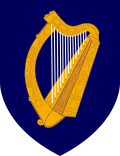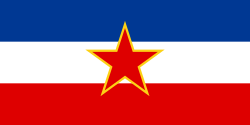Ireland–Yugoslavia relations
Appearance
The topic of this article may not meet Wikipedia's general notability guideline. (January 2021) |
 | |
Ireland |
Yugoslavia |
|---|---|
Ireland–Yugoslavia relations (
Tito-Stalin split Yugoslavia focusing on diplomatic relations within the Non-Aligned Movement. During the Informbiro period Yugoslavia indirectly associated itself with NATO via the Balkan Pact (1953)
.
Country comparison
| Common name | Ireland | Yugoslavia |
|---|---|---|
| Official name | Republic of Ireland | Socialist Federal Republic of Yugoslavia |
| Coat of arms |  |
 |
| Flag |  |
 |
| Capital | Dublin | Belgrade |
| Largest city | Dublin | Belgrade |
| Population | 3,970,155 | 23,229,846 |
| Government | Unitary Parliamentary republic | Socialist republic |
| Official languages | English, Irish | No official language
Serbo-Croatian (de facto state-wide) Slovene (in Slovenia) and Macedonian (in Macedonia) |
| First leader | Douglas Hyde | Joseph Broz Tito |
| Current/last leader | Michael D. Higgins | Milan Pančevski |
| Religion | Catholic church (de facto), Secular state (de jure)
|
Secular state (de jure), state atheism (de facto) |
| Alliances | EEC | Non-Aligned Movement |
History
1920s to 1950
The
In 1946, the
Ustashe genocide against Serbs of Croatia and Serbs of Bosnia and Herzegovina.[2] He critiqued Irish public discourse on persecution of Catholicism in postwar Yugoslavia by highlighting what was in Ireland lesser known story of Catholic clergy complicity and collaboration with quisling regime.[2] He published multiple texts on the topic including an essay titled "The Sub-Prefect Should Have Held His Tongue".[2] During his rebuttal of Count O'Brien lecture at the Foreign Affairs Association, papal nuncio in Ireland walked out of the room leading to public scandal and what was described as Butler's internal exile.[2]
1955 friendly soccer game incident
In 1955, one year after Yugoslavia defeated
Raidió Teilifís Éireann declined to cover the game after its main sports commentator Phil Greene pulled out of the broadcast.[4] As the game went ahead and was attended by 21,400 fans it was interpreted by many as a public protest against conservatisms and excessive influence of the Catholic Church in Ireland in public life.[4]
From 1960
In 1967,
Radio Television Belgrade recorded a documentary on daily life in Ireland which was presented to audiences in the Socialist Republic of Serbia.[5]
The two countries cancelled their mutual visa requirements in reciprocity in 1974,[6] and formal diplomatic relations were established in 1977.[6] In 1980 President Patrick Hillery, Tánaiste George Colley along with Ruairí Ó Brádaigh of Sinn Féin, Andy Barr of the Communist Party of Ireland and Billy McKee of the Provisional Irish Republican Army all attended the state funeral of President Josip Broz Tito.
Following the breakup of Yugoslavia, Irish judge Maureen Harding Clark served at the International Criminal Tribunal for the former Yugoslavia.[7]
See also
- Yugoslavia–European Communities relations
- Croatia–Ireland relations
- Ireland–Kosovo relations
- Yugoslavia in the Eurovision Song Contest 1971
- Yugoslavia in the Eurovision Song Contest 1988
- Ireland in the Eurovision Song Contest 1990
References
- ^ a b Ljubodrag Dimić (2009). "Преглед: Југословени и Ирска револуција 1916–1923". Arhiv. 1–2. Archives of Yugoslavia.
- ^ ISBN 978-0-300-18279-8.
- ^ Mirjana Cupek Hamill (2014). "Slučaj nadbiskupa Stepinca - irska perspektiva". Radovi. 46. Zavod za hrvatsku povijest. Retrieved 14 December 2020.
- ^ a b c d McCabe, Conor (15 September 2016). "CATHOLICS, COMMUNISTS & HAT-TRICKS: THE IRELAND V YUGOSLAVIA SOCCER INTERNATIONAL OF 1955". Beyond the Last Man. Retrieved 13 January 2021.
- ^ "С камером кроз свет -Ирска". Radio Television of Serbia. 6 July 2019. Retrieved 14 January 2021.
- ^ a b "Irska". Ministry of Foreign Affairs (Serbia). 9 July 2018. Retrieved 14 January 2021.
- ^ "Former Judges". International Criminal Tribunal for the former Yugoslavia. Retrieved 26 February 2021.



